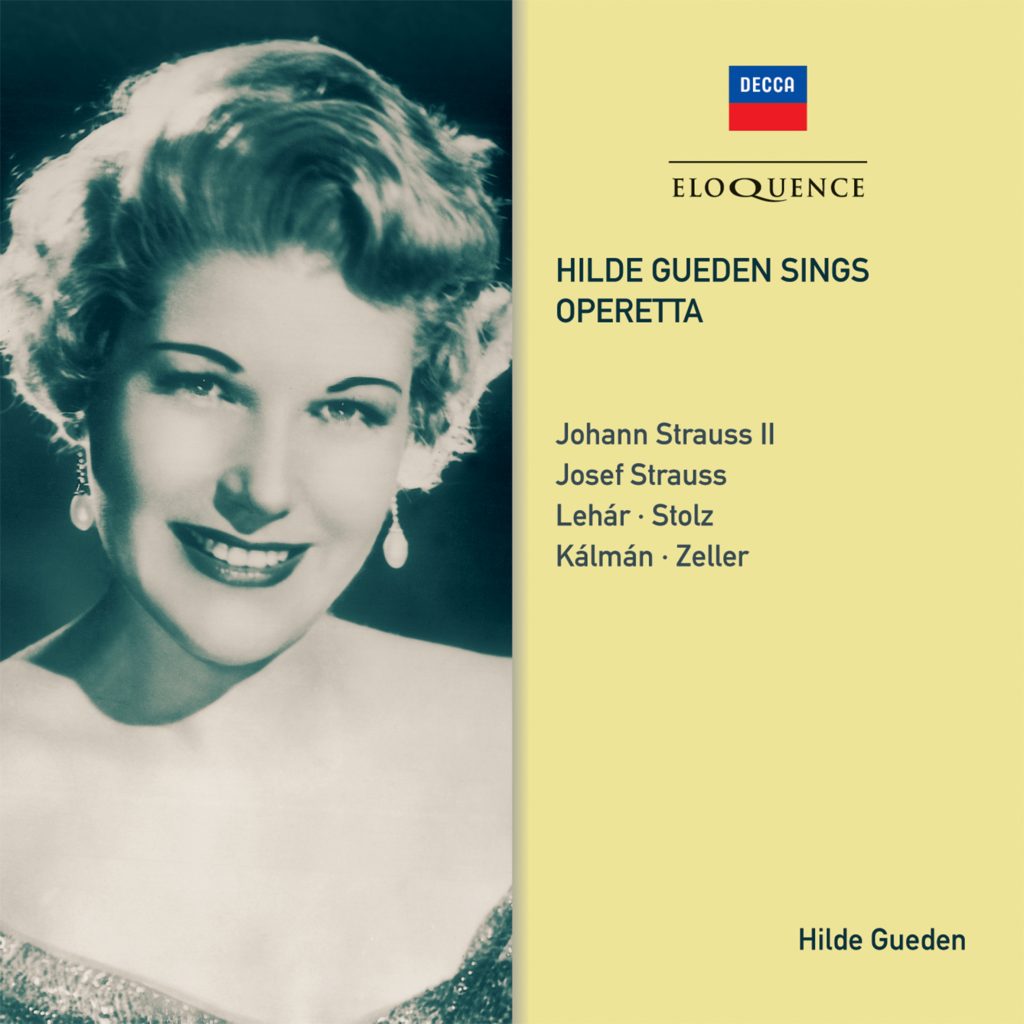Several countries have their light operas: the British their Gilbert and Sullivan, the Spanish their zarzuelas, the French their operettes. All of these display quite tight-knit styles but the operetta tradition of Austria and specifically Vienna, is more diffuse, reflecting the differing styles of folk music found in the old Austro-Hungarian Empire. The world of operetta is a never-never-land of handsome hussar officers, princes and princesses, counts and countesses and romantic gypsies beloved of bourgeois Viennese who would probably hate to meet a real gypsy. The waltz that most insidious of dances, is never far away. It is a kind of music that demands a special way of singing – yielding, lilting phrasing, often rather laidback rhythms, unless the singer is suddenly breaking into the fast section of a Hungarian czárdás. Artists from other countries can make a good stab at it but the real thing is unmistakable when we encounter it. Hilde Gueden was the real thing.
Her first operetta studio session was held at Kingsway Hall in London in April 1949 with a pick-up ensemble conducted by Hans May. As well as two Lehár favourites, among these six tracks (CD1 5–10) are rarities by Nico Dostal and Franz Grothe. Two ‘Giuditta’ excerpts come from the 1957 complete set in which Gueden starred with her longtime colleague Waldemar Kmentt; and their duet from ‘Der Graf von Luxemburg’ is from the 1965 disc of excerpts. The celebrated Vilja-Lied, from the 1958 recording of ‘The Merry Widow’ has seldom, if ever, been better done.
Included on CD2, is her recording with Robert Stolz of twelve ‘operetta evergreens’ – the delightful cover of the original LP reproduced together with another five in the booklet. Josef Krips – who enjoyed conducting music of the Strauss family – accompanies her in two of the composers waltzes and a real rarity is her very last recording. Made with Horst Stein and the Suisse Romande, it yielded just two arias: Marietta’s Lied from Korngold’s 1920 opera ‘Die Tote Stadt’ and ‘Depuis le jour’ from Charpentier’s ‘Louise’.
Several of the recordings on the set are released internationally on Decca CD for the first time and this collection, recorded over a twenty-year period (1949–1969) offers a great glimpse of one of Vienna’s greatest opera stars in lighter (but not necessarily less demanding) fare.
CD 1
Medley: Wiener Blut (J. Strauss II) – Die Fledermaus (J. Strauss II) – Sissy (Kreisler)
Medley: Gräfin Mariza (Kálmán) – Der Tapfere Soldat (Strauss) – Madame Pompadour (Fall) – Die Dollarprinzess (Fall) – Zigeunerliebe (Lehár)
Medley: Hoheit tanzt Walzer (Ascher) – Die Schätzmeister (Ziehrer) – Der Zarewitsch (Lehár) – Schön ist die Welt (Lehár)
Medley: Rund um die Liebe (Straus) – Die lustige Witwe (Lehár) – Ein Walzertraum (Straus) – Wiener Blut (J. Strauss II) – Die Tänzerin Fanny Elssler (J. Strauss II) – Wiener Blut (J. Strauss II)
Wiener Staatsopernchor
Wiener Staatsopernorchester
Max Schönherr
ROBERT STOLZ: Der Favorit: Du sollst der Kaiser meiner Seele sein
NICO DOSTAL:
Clivia: Ich bin verliebt
Die Flucht ins Glück: Wiegenlied
FRANZ GROTHE: Die Schwedische Nachtigall: Postillion Lied
FRANZ LEHÁR:
Paganini: Liebe, du Himmel auf Erden
Der Zarewitsch: Einer wird kommen
Kingsway Symphony Orchestra
Hans May
FRANZ LEHÁR:
Giuditta: Schön wie die blaue Sommernacht
Giuditta: Meine Lippen, sie küssen so heiss
Wiener Staatsopernchor
Wiener Staatsopernorchester
Rudolf Moralt
FRANZ LEHÁR: Der Graf von Luxemburg: Sind Sie von Sinnen
Wiener Volksopernorchester
Max Schönherr
FRANZ LEHÁR: Die lustige Witwe: Vilja-Lied
Wiener Staatsopernchor
Wiener Staatsopernorchester
Robert Stolz
CD 2
EMMEERICH KÁLMÁN:
Grafin Mariza: Entry of Gräfin Mariza
Grafin Mariza: Sag’ ja, mein Lieb, sag’ ja
ROBERT STOLZ: Im weissen Rössl: Mein Liebeslied muβ ein Walzer sein
FRANZ LEHÁR Der Zarewitsch: Kosende Wellen
LEO FALL: Madame Pompadour: Heut’ könnt einer sein Glück bei mir Machen
JOHANN STRAUSS II: Casanova: Nuns’ Chorus
FRANZ LEHÁR: Zigeunerliebe: Hör’ ich Zymbalklänge
ROBERT STOLZ: Der Favorit: Du sollst der Kaiser meiner Seele sein
JOHANN STRAUSS II: Die Fledermaus: Mein Herr Marquis
CARL ZELLER: Der Obersteiger: Sei nicht bös
OSCAR STRAUS: Der Tapfere Soldat: Held meiner Träume
JOHANN STRAUSS II: Wiener Blut: Ich war ein echtes Wiener Blut … Wiener Blut
Wiener Staatsopernorchester
Robert Stolz
JOHANN STRAUSS II: Frühlingsstimmen
JOSEF STRAUSS: Dorfschwalben aus Österreich
Wiener Philharmoniker
Josef Krips
EICH WOLFGANG KORNGOLD: Die tote Stadt: Glück, das mir verblieb
GUSTAVE CHARPENTIER: Louise: Depuis le jour
Wiener Philharmoniker
Horst Stein
Hilde Gueden, soprano
Recording Producers: unknown (CD1: 1–10); Erik Smith (CD1: 11–12, 14); Christopher Raeburn (CD1: 13, CD2: 1–12); John Culshaw (CD2: 13–14); David Harvey (CD2: 15–16)
Balance Engineers: unknown (CD1: 1–10); James Brown (CD1: 11–12, CD2: 1–12, 13–14); James Brown, Gordon Parry (CD1: 13); Kenneth Wilkinson (CD1: 14); James Brown, Colin Moorfoot (CD2: 15–16)
Recording Locations: Kingsway Hall, London, UK, April 1949 (CD1: 5–10); Grosser Saal, Musikverein, Vienna, Austria, June 1954 (CD1: 1–4); Sofiensaal, Vienna, Austria, 12 October 1956 (CD2: 13–14); 1–11 October 1957 (CD1: 11–12), 10–17 March 1958 (CD1: 14), April–May 1961 (CD2: 1–12), 10–14 May 1965 (CD1: 13), 12 November 1969 (CD2: 15–16)
Remastering Engineer: Chris Bernauer
‘The performances are all good, all appealing … Gypsy Baron is done with great authenticity: first the yearning, then the high jinks’ (Medleys: Max Schönherr) Gramophone
‘Hilde Gueden sings with charm and affection … she caresses the legato melodies beautifully’ (CD2: 1–12) Gramophone

